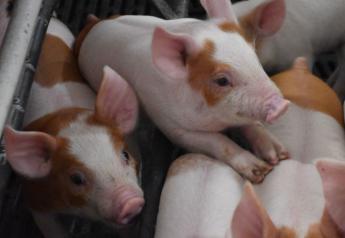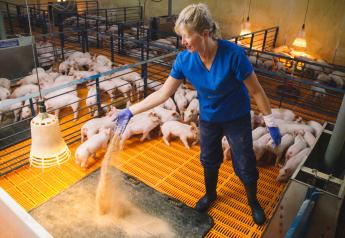Murphy: Viva la France

In some quarters, it’s de rigueur to bash the French for their (alleged) failure to follow the U.S. lead on security issues. But now, they’re leading the movement to rein in alt-meat labeling.
In honor of the state visit of French President Emmanuel Macron, who’s in Washington, D.C., this week for talks with President Trump on the Iran agreement and other security issues, let’s note that another development originating in Paris may influence animal agriculture in the United States.
It is clear that the French government is opposed to tearing up the Iran nuclear deal, the Joint Comprehensive Plan of Action (JCPOA), preferring to find ways to strengthen its compliance and verification measures.
“I think we can usefully add to the JCPOA,” Macron told a joint news conference at the White House on Tuesday, citing additional limitations on Iran's ballistic missile program and limiting that nation’s regional influence.
“It’s about respecting the sovereignty of the states in the region,” he said. “It’s not about tearing apart an agreement but building something new that will cover all of our concerns.”
Whether that approach prevails is as yet uncertain, but the French have also signaled opposition to another ongoing issue, this one less about global security and more about rationally dealing with the emerging category of cultured alt-meat products.
Considering the fact that the French are serious meat-eaters — about 190 pounds (meat and poultry combined) per person per year, compared with about 222 pounds per person in the USA — a measure that has just been enacted into law outlawing such food labeling descriptions as “meat-free steaks” and “bacon-like rashers” is one that’s worthy of scrutiny.
Striking Down Soy
According to BBC News, the measure specifies that French food producers will no longer be able to use “steak,” “sausage,” “meat-like,” “meat-free” or other similar labeling terms to describe products that are not partly or wholly composed of meat.
“It is important to combat false claims,” French MP Jean-Baptiste Moreau, a member of President Macron’s La République En Marche party, said in a tweet. “Our products must be designated correctly: the terms of ‘cheese’ or ‘steak’ will be reserved for products of animal origin.”
The measure also applies to vegetarian products marketed as dairy alternatives, flowing a ruling last year by the European Court of Justice that plant-based foods cannot be sold in the EU labeled as “milk,” “butter” or “cheese.” That ruling was prompted by a lawsuit brought by a German consumer group challenging a company called TofuTown that was selling “Soyatoo Tofu Butter” and “Veggie Cheese.”
Violators of the new regulation could be fined up to €300,000 euros, or about $366,000.
Of course, vegetarian activists are up in arms, claiming that the new law is a capitulation to the country’s meat industry. But supporters argue that consumers have too often been confused by packaging that appears to be a meat product but may contain nothing of animal origin.
Is it really an issue of consumer confusion? Partly so.
Research shows that only a minority of food shoppers bother to read labels or to peruse an ingredient list. For example, a recent University of Minnesota study reported in TIME magazine noted that 33% percent of adult participants said they “almost always” looked at a product’s calorie content on the Nutrition Facts label; 31% said they “almost always” looked at total fat content; 24% said they closely studied products’ sugar content; and 26% said they paid close attention to serving size.
However, the use of a sophisticated eye-tracking device revealed that when shown a variety of food packages — some 64 brands of cereal, crackers, soup, cookies and ice cream — only 9% looked at the calorie count for almost all the items; only 1% looked at all the other components, including total fat, trans fat, sugar and serving size.
You can’t be fooled by labeling if you’re not bothering to read those labels.
It is likely that a few consumers might pick up a package of a vegetarian analog product, thinking it to be the real deal — only such products in this country tend to be labeled as Fishless Fillets, Veggie Brats or Chickenless Crispy Tenders.
It's difficult to misinterpret the content of those products.
In reality, labeling of alt-meat and plant-based analogs isn’t an issue of consumer confusion. That’s how proponents are positioning it, because nobody’s in favor of confusion.
But restrictions on non-meat product labeling are more about maintaining fair competition in the marketplace. Theoretically, all the branding and positioning supporting beef, pork and poultry products shouldn’t be used as a platform for producers who want to sell people a product that looks and tastes like those foods, but doesn’t deliver the same ingredients, or arguably, the same nutritional and sensory value.
However, I still contend that down the road, if it hasn’t already occurred, the target audience for alt-meat products will prefer that they be labeled as something other than the very foods they’re determined to avoid.
And if food scientists and technologists are capable of creating cultured products that mimic the appearance and flavor of meat or poultry using plant proteins and cellular bioscience, there’s a high likelihood they’ll also be capable of creating new nomenclature for their innovative products lines.
In the near future, laws banning terms such as “meat-like” will become as dated and unnecessary as the insistence on calling that sliced potato order Freedom Fries.
The opinions in this commentary are those of Dan Murphy, a veteran journalist and commentator







